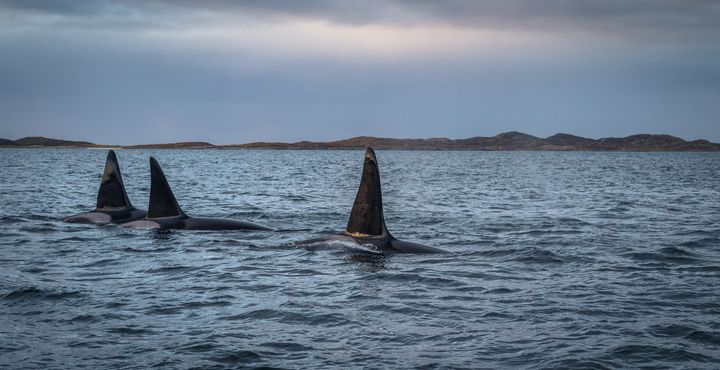
Giant great white sharks that are normally top of the food chain flee when killer whales enter their territory, scientists have discovered. The team was studying a population of sharks at the Greater Farallones National Marine Sanctuary, off San Francisco, when they realized the sharks would disappear for an entire season after orca turned up at the site.
"These are huge white sharks. Some are over 18 feet long (5.5 meters), and they usually rule the roost," Scot Anderson, a scientist with Monterey Bay Aquarium, said in a statement. "On average we document around 40 elephant seal predation events by white sharks at Southeast Farallon Island each season," Anderson said. "After orcas show up, we don't see a single shark and there are no more kills."
Reporting their findings in the journal Scientific Reports, researchers tracked encounters between great white sharks and orca. They looked at data from 165 tagged great whites between 2006 and 2013, and they looked at 27 years worth of surveys on seal, great white and orca in the region.
Great white sharks gather at the Farallones every year between September and December to hunt young elephant seals. They normally spend about a month at the Southeast Farallon Island—and this is the point where great whites and orcas overlap. The killer whales also prey on elephant seals, but their presence is transient and they only turn up at the island occasionally.
In the few instances where the predators overlapped, the sharks would swim away within minutes. "When confronted by orcas, white sharks will immediately vacate their preferred hunting ground and will not return for up to a year, even though the orcas are only passing through," Salvador Jorgensen, a senior research scientist at the Monterey Bay Aquarium and lead author of the study, said in a statement.
The sharks, they found, would go off to another elephant seal colony where they would have to crowd together, or they would head out father offshore. The team say the findings show that food chains are complicated—and interaction between top predators in the ocean is difficult to understand because it is so rarely documented.
"We don't typically think about how fear and risk aversion might play a role in shaping where large predators hunt and how that influences ocean ecosystems," Jorgensen said. "It turns out these risk effects are very strong even for large predators like white sharks—strong enough to redirect their hunting activity to less preferred but safer areas."
Previously, orcas have been known to kill sharks and eat their livers. In False Bay, South Africa, scientists discovered the remains of sevengill sharks that had been killed with "a specialized feeding method in which only the liver of each shark was consumed." In 2017, researchers also said they suspected two killer whales had killed five great white sharks a bit further up the coast.
Anderson and Jorgensen say it is not clear whether the orca off San Francisco would have targeted and killed the great whites. Instead, the killer whales might have bullied the sharks out of the area so they could take advantage of the elephant seals there. They note that there is only one confirmed case where killer whales directly preyed on a great white shark at the Southeast Farallon Island.
"Occasional consumption of the highly-caloric liver of white sharks may confer ancillary energetic benefits to the killer whale," the study says. "The fitness loss to white sharks from direct lethal interactions with killer whales is unambiguous."
Concluding, it says: "Future efforts should aim to measure the impact and ecological implications of these risk effects on white shark fitness and elephant seal population dynamics."
Uncommon Knowledge
Newsweek is committed to challenging conventional wisdom and finding connections in the search for common ground.
Newsweek is committed to challenging conventional wisdom and finding connections in the search for common ground.
About the writer
Hannah Osborne is Nesweek's Science Editor, based in London, UK. Hannah joined Newsweek in 2017 from IBTimes UK. She is ... Read more
To read how Newsweek uses AI as a newsroom tool, Click here.








